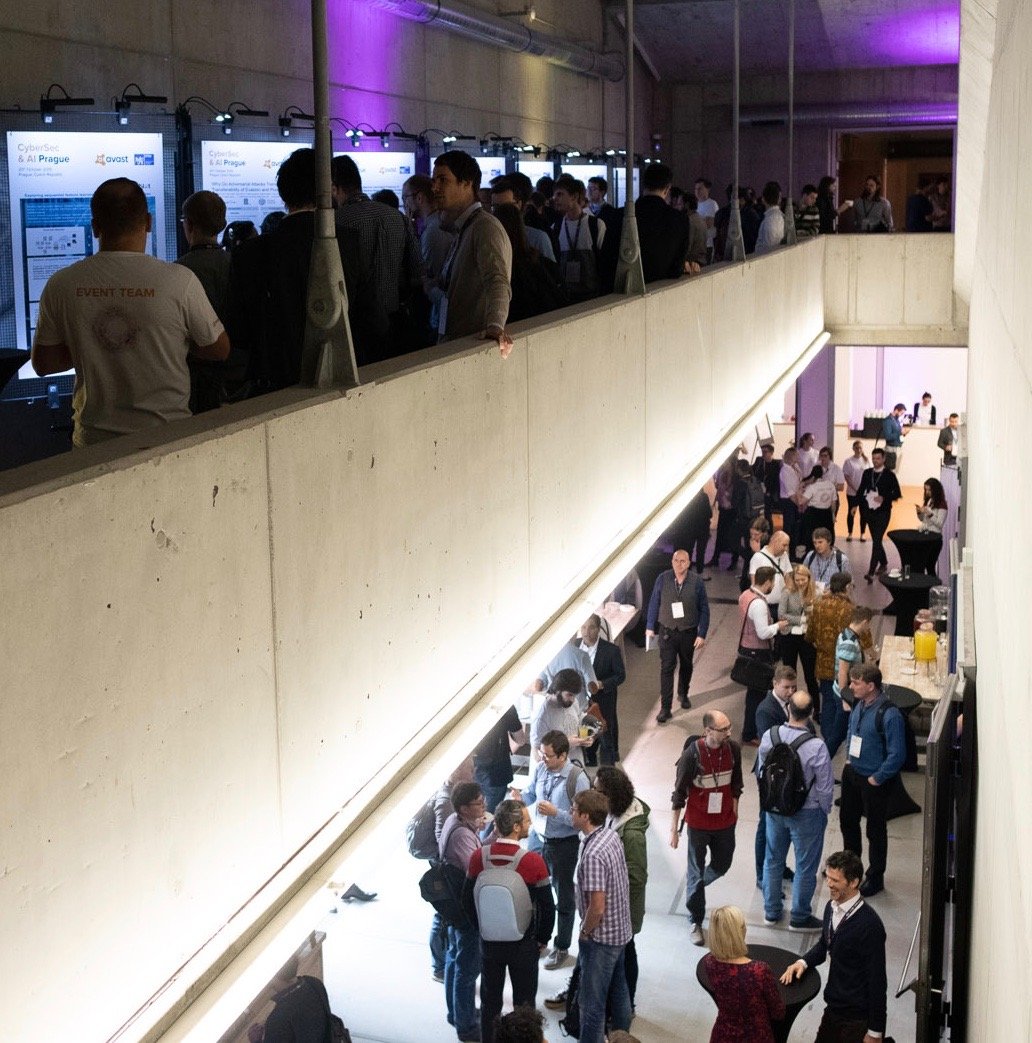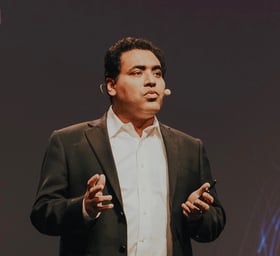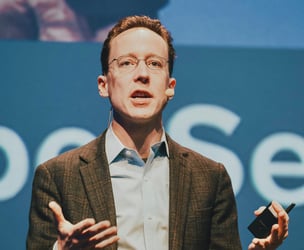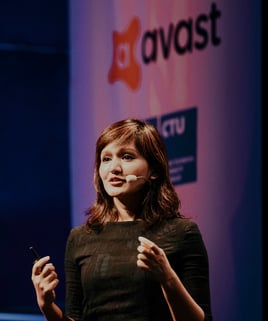Speakers and presenters from 11 nations draw an overflow crowd to artificial intelligence cybersecurity conference
Cybersecurity must find new ways to employ artificial intelligence and make the world safer and more secure, speakers on Friday told the sold-out CyberSec & AI Prague conference hosted by Avast and the Czech Technical University.
“How can AI help us to live free, safe and secure?” Michal Pechoucek, Avast’s new chief technical officer (pictured above), asked the audience in the amphitheatre of Prague’s DOX Centre for Contemporary Art. “We can solve this riddle.”
“How can AI help us to live free, safe and secure? We can solve this riddle.” – Michal Pechoucek, Avast’s new chief technical officer
The conference brought speakers and presenters from 11 countries to discuss topics that included the machine vs. machine battle of adversarial AI, and election hacking.

Between sessions an overflow crowd of around 300 mingled in the sleek industrial Dox Centre and admired student research projects in a “poster session” that included a complex concept depicted with Pokemon characters – perhaps the first meeting of Pikachu and AI conformal evaluators in cybersecurity history.
 Avast’s own artificial intelligence teaches its top-rated antivirus, anti-tracking products, Internet of Things home network innovation Omni, and other products how to protect users every day, said Avast’s head of AI, Rajarshi Gupta (pictured) in a presentation explaining “real AI for real people.” His takeaway, he said, was that “AI in security is real and working daily to protect hundreds of millions of Avast users.”
Avast’s own artificial intelligence teaches its top-rated antivirus, anti-tracking products, Internet of Things home network innovation Omni, and other products how to protect users every day, said Avast’s head of AI, Rajarshi Gupta (pictured) in a presentation explaining “real AI for real people.” His takeaway, he said, was that “AI in security is real and working daily to protect hundreds of millions of Avast users.”
The subject matter of the conference was a combination of everyday problems and elite academic research.
“Election security affects everyone,” said presenter Alex Halderman (pictured), a computer science professor at the University of Michigan who has researched the hacking of elections around the world since a decade before the 2016 U.S. presidential election made it front-page news.
 As few as 30,765 changed votes could have altered the outcome of the 2016 U.S. presidential election outcome, and “Next time things could be a lot worse,” he said. His suggestion – unusual for a cybersecurity conference – was to use paper ballots as well as electronic ones in elections. “If we can have a physical failsafe, we absolutely want that.” The United States and other governments need to get to work urgently on this, he said.
As few as 30,765 changed votes could have altered the outcome of the 2016 U.S. presidential election outcome, and “Next time things could be a lot worse,” he said. His suggestion – unusual for a cybersecurity conference – was to use paper ballots as well as electronic ones in elections. “If we can have a physical failsafe, we absolutely want that.” The United States and other governments need to get to work urgently on this, he said.
Adversarial AI, which Avast researchers have called the “active arms race (that) makes AI in security particularly challenging,” was a key theme of the day, explored in a talk by Avast researcher Sadia Afroz (pictured) and in other sessions of the one-day event. 
Adversarial AI attacks on cybersecurity’s malware detectors “might seem theoretical, but actually they are already happening in the wild,” Afroz said. The cybersecurity industry must work to update AI models so they can fend off these evolving attacks, she said.
Closing the day was a panel titled “AI For Good And Evil” moderated by journalist Dave Gershgorn and featuring academics from three nations and Avast’s Gupta. “The algorithms are not the problem. They are not evil. It’s the responsibility of this community to build the models and do the training the right way,” Gupta said. He later added that cybersecurity is “the only field of AI where we have a true adversary. Let’s all work together to take this field forward.”
"It’s the responsibility of this community to build the models and do the training the right way.” – Rajarshi Gupta, Avast’s head of AI
The CyberSec AI Prague conference will continue to be a place where the AI cybersecurity community pulls together, the audience learned.
Pechoucek, the Avast CTO, said the conference was the culmination of a year’s work. “And it happened. This dream came true.” He then announced CyberSec & AI Prague 2020. “This event will happen here next year.”